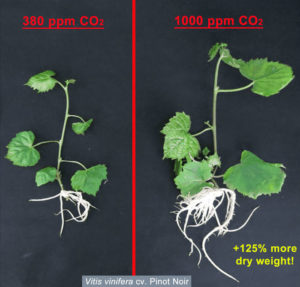by Zhao et al., 2019 in BMCPlantBiology/CO2Science
Recognizing that increasing atmospheric CO2 concentrations promotes plant development and growth, Zhao et al. set out to investigate the effect of elevated CO2 on a key wine grape variety, Pinot Noir.
Their experiment was conducted in controlled climate chambers at the Fruit Tree Physiology and Biotechnology Laboratory, College of Horticulture, Gansu Agricultural University, China. Grape plantlets (Vitis vinifera, cv. Pinot Noir) were propagated and then cultured in a 2% sucrose solution at either ambient (380 ppm) or elevated (1,000 ppm) CO2 concentrations for a period of 25 days. At the end of the experiment the authors examined the impact of CO2 on various growth-related parameters, while also conducting transcriptomic and proteomic analyses.
Results indicated that elevated CO2 stimulated total plant dry weight, leaf area and plant height by 125%, 96% and 31%, respectively (see Figure 1). Photosynthetic parameters also revealed a CO2-induced stimulation and the various physiological changes were found to be related to differentially expressed genes and proteins among the plants growing in the two environments. Such findings suggest Pinot Noir may well be a “winner” (in terms of growth and development) among plants in the future if the air’s CO2 content continues to rise.
Figure 1. Visual display of the growth differences between grapes grown under ambient (380 ppm) or elevated (1,000 ppm) CO2 concentrations for 25 days. The average dry weight of the grapes growing under elevated CO2 was 125% greater than those growing under ambient CO2. Source: Zhao et al. (2019).

